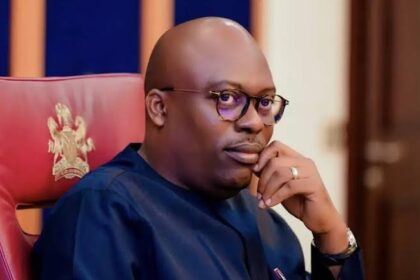More than six months after President Muhammadu Buhari presented the 2018 expenditure profile for lawmakers’ consideration and passage, the bill was laid at the Senate and the House of Representatives yesterday.
The document was presented to a joint sitting by the President on November7, last year with a plea that the lawmakers should expedite action so that the country could return to the traditional January to December budget cycle.
On presentation yesterday, the estimate was jacked up by N508 billion to take it to N9,120, 334,988,225 from the N8.6 trillion presented by the President.
Following the laying of the report of the Appropriations Committee of the House by its Chairman Mustapha Dawaki yesterday, Deputy Speaker Yussuff Lasun, who presided over plenary, said the report would be considered between today and tomorrow and passed.
“Members are advised to pick up copies of the budget report from 8am tomorrow (today), then we converge in the afternoon to consider it and pass it on Thursday,” he said.
The document was also laid at the Senate by Appropriations Committee Chairman Danjuma Goje.
Senate President Bukola Saraki did not make any remarks on when the report would be adopted.
According to the document, N530,421,368,624 was proposed for statutory transfer; N2,869,600,351,825 for development fund for capital expenditure; N3,516,477,902,077 for recurrent (non-debt) expenditure; N2,203,835,365,699 is for debt service; and N199b for sinking fund for maturing loans.
The assumptions and projections were based on a benchmark crude oil price of $45 per barrel; oil production estimate of 2.3 million barrels per day; exchange rate of N305 for 2018; Real GDP growth of 3.5 per cent; and inflation rate of 12.4 percent.
The proposed aggregate expenditure of N 8.612 trillion, which was 16 per cent above 2017 budget estimate, will comprise Recurrent Costs of N3.494 trillion; Debt Service of N2.014 trillion; Statutory Transfers of about N456b; Sinking Fund of N220b to retire maturing bond to local contractors; and Capital Expenditure of N2.428 trillion, excluding the capital component of statutory transfers.
On the Recurrent expenditure, a substantial part is for the payment of salaries and overheads in key ministries that provide critical public services.
In that category, N510.87b was proposed for Interior; N435.01b for Education; N422.43b for Defence; and N269.34b for Health.
Key Capital spending allocations in the 2018 Budget as presented by the President include: N555.88b ( Power, Works and Housing); N263.10b (Transportation); N150b (Special Intervention Programmes); N145b (Defence); N118.98b (Agriculture and Rural Development); N95.11b (Water Resources); N82.92b (Industry, Trade and Investment); N63.26b (Interior); N61.73b (Education); N109.06b (Universal Basic Education Commission); N71.11b (Health); N40.30b (Federal Capital Territory); N100b (Zonal Intervention Projects); N45b (North East Intervention Fund); N53.89b (Niger Delta Ministry); and N71.20b (Niger Delta Development Commission).
In addition, N9.8b was proposed for the Mambilla hydro power project, including N8.5b as counterpart funding, N12b counterpart funding earmarked for transmission lines and substations as well as N35.41b for the National Housing Programme.
As part of key projects and programmes to be implemented in 2018, the President proposed N10b for the 2nd Niger Bridge; N300b was proposed for the construction and rehabilitation of strategic roads.
For regional spending priorities for peace, security and development, N65b was proposed for the Presidential Amnesty Programme. It is retained in the budget.
The Capital provision for the Ministry of Niger Delta was increased to N53.89b from the N34.20b provided in 2017. The completion of the East-West Road had a provision of about N17.32b.



